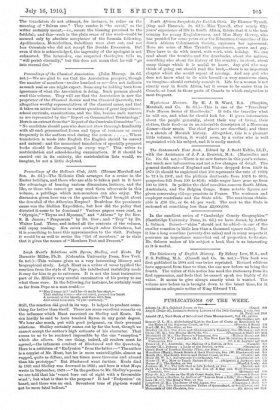Leigh Hunt's Relations with Byron, Shelley, and Keats. By Barnette
Miller, Ph.D. (Columbia University Press, New York. 5s. net.)—This volume gives us a very interesting literary and biographical study. Leigh Hunt as a writer of verse typified the reaction from the style of Pope ; his intellectual instability made it easy for him to go to extremes. It is not the least instructive part of Dr. Miller's very careful examination of his poetry to see what these were. In the following, for instance, he certainly went as far from Pope as a man could :— " May I come in ? ' said he—it made her start,— That smiling voice she coloured, pressed her heart A moment as for breath, and then with free And usual tone said, ' 0 yes—certainly.' " Still, the reaction did good in its way. It helped to produce some- thing far better than itself. There are some excellent remarks on the influence which Hunt exercised on Shelley and Keats. He can hardly be said to have touched Byron in any great degree. We hear also much, put with good judgment, on their personal relations. Shelley certainly comes out by far the best, though we cannot accept the author's high estimate of his character. That seems to us to be rendered impossible by the one " exception " which she allows. On one thing, indeed, all readers must be agreed,—the infamous conduct of Blackwood and the Quarterly. Here is a criticism of " Endymion " from the latter :—" The author is a copyist of Mr. Hunt, but he is more unintelligible, almost as rugged, quite as diffuse, and ten times more tiresome and absurd than his prototype." But Black-wood went further. Keats died in 1821 and Shelley was drowned in 1822; and here is what Maga wrote in September, 1824 :—" In the preface to Mr. Shelley's poems we are told that his vessel bore out of sight with a favourable wind'; but what is that to the purpose ? It had Endymion' on board, and there was an end. Seventeen tons of pig-iron would not be more fatal ballast."






































 Previous page
Previous page